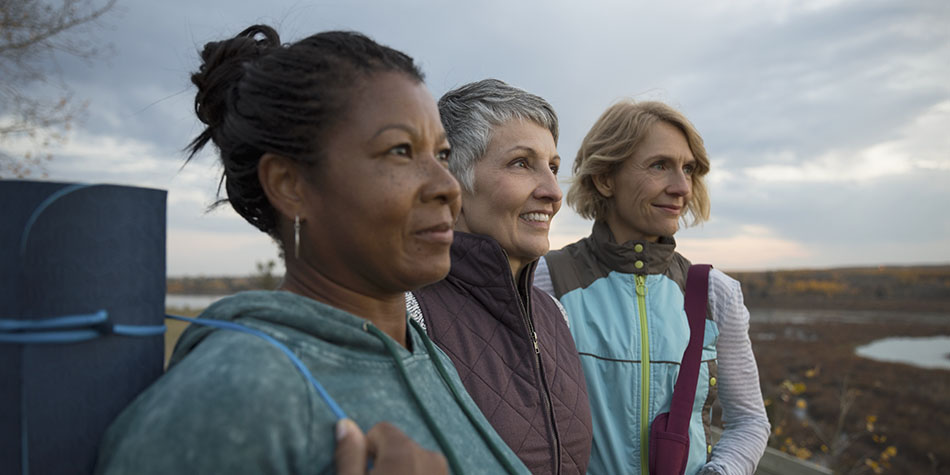

Melissa Johnson, MD
Director, Lung Cancer Research Sarah Cannon Research Institute at Tennessee Oncology
To diagnose lung cancer, your care team will conduct a series of tests to determine if there is an abnormality, if the abnormality is cancerous, and if so, the cancer’s stage and your treatment options. Melissa Johnson, MD, Director of Lung Cancer Research for Sarah Cannon Research Institute at Tennessee Oncology, shares what you should know about how lung cancer is diagnosed, including the symptoms to be aware of, tests that your doctors may perform, and how those tests determine the treatment plan.
The symptoms
Symptoms related to breathing may include a persistent or chronic cough that gets worse over time, frequent pneumonia or bronchitis that does not get better with antibiotics, a change in the sputum or new blood in the sputum, and more. Other symptoms may include weight loss, fatigue, appetite loss, fever, bone or back pain or fractures, headaches, and more. For a full list of signs and symptoms of lung cancer, visit Know the signs and symptoms of lung cancer on the Sarah Cannon Blog.
If you or a loved one is experiencing symptoms of lung cancer, it is important that you call your healthcare provider immediately to schedule an in-person or telehealth visit.
The diagnosis
You will first meet with your primary care physician, who will order a series of tests.
The first test that your doctor may do is a chest X-ray or a CT scan to evaluate a person who is experiencing symptoms in his or her chest. If an X-ray and/or CT scan identifies an abnormality, the next step is for your doctor to order a biopsy.
A biopsy may be done in different ways. Your physician may refer you to a pulmonologist for a bronchoscopy, in which the doctor will insert a camera into your lung to take pictures of the abnormality and possibly take a sample of cells. Other times, the primary care physician may refer you to a radiologist who may use CT scan images to obtain a needle biopsy or directly to a surgeon for a biopsy. If a biopsy proves that the abnormal spot or nodule is lung cancer, you will undergo additional tests.
A PET scan will help the physician to understand whether the cancer is limited to the lungs or chest or has begun to spread to lymph nodes or other organs. If the cancer is confined to the chest and can be resected with surgery, the doctor may recommend a pulmonary function test to determine if you are fit to undergo surgery. Another way to treat lung cancer limited to the chest is with focused radiation to the lung nodule. Your doctor may also recommend an MRI to see if the cancer has metastasized to the brain.
The treatment
These tests will help define where the cancer is located as well as the stage of cancer, and stage of cancer will determine the appropriate treatment. If it is an early stage cancer (Stage 1 or 2) you may undergo surgery or radiation to destroy the cancer. If the cancer is Stage 3 or 4, it has spread outside of the chest to the lymph nodes or other organs, and you would be treated with chemotherapy and radiation or chemotherapy and immunotherapy.
Speaking with your care team
When meeting with a medical oncologist, is it important that he or she discuss with you the stage of the cancer and the treatment plan, including clinical trials options that might be available to you. At Sarah Cannon, we believe clinical trials should be the first step in fighting a cancer, not the last. Additionally, the medical oncologist should speak with you about broad molecular profiling or other tests that can help refine and tailor the right therapy for you from the beginning. You may also discuss with a member of the palliative care team, who work closely with our medical oncology team to address the symptoms or side effects associated with the lung cancer and its diagnosis, including pain, appetite, difficulty breathing in addition to psychological, social, and spiritual needs which help set patients up for success with all anti-cancer treatments.
Sarah Cannon nurse navigators help patients through every step of the cancer journey. Nurse navigators assist patients throughout their cancer journey by reinforcing patient education, coordinating office visits, serving as an ongoing source of support, and so much more. To learn more about our nurse navigators, visit Nurse navigators on the Sarah Cannon website.
Lastly, if you currently use tobacco products, speak with your care team about smoking cessation. “The number one risk factor for developing lung cancer is a history of tobacco use, and it’s never too late to quit,” says Dr. Johnson. “The lungs begin to remodel from the day you stop smoking - regardless of when that is.”
If you have questions about lung cancer, visit our cancer education section of our website or call askSARAH at (844) 482-4812 to speak to a nurse who is specially trained to help with your cancer questions or visit askSARAH online.